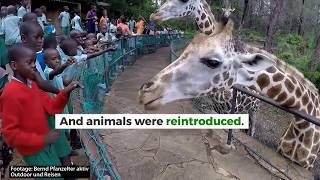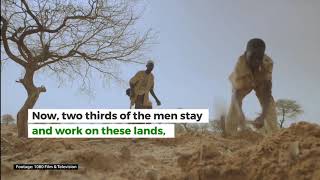The CGIAR Research Program on Forests, Trees and Agroforestry (FTA) will be participating throughout this year’s Global Landscapes Forum (GLF) Bonn, held on Dec. 1-2, 2018.
With the urgency of acting against environmental degradation and climate change, GLF Bonn 2018 will be key in drawing out the next steps toward hitting sustainability targets. Organizations and individuals from across sectors and backgrounds will stir up conversations to boost action on the ground and learn from local experiences.
FTA is hosting Discussion Forum 1: Delivery of quality and diverse planting material is a major constraint for restoration. What solutions, what emerging needs?, which is organized by Bioversity International in collaboration with the World Agroforestry Centre (ICRAF). FTA work will also be represented in other important discussion forums and side events, as listed below.
FTA will have a presence at the event’s pavilions, including the Inclusive Finance and Business Engagement Pavilion. Visit the Tropenbos International (TBI) and CIFOR booths to find FTA find resources and materials, and hear talks that are set to take place in the pavilions.
Furthermore, FTA partner TBI will present a Landscape Talk entitled Let’s talk about governance: A participatory approach to assessing landscape governance. Other notable speakers include CIFOR’s Director General Robert Nasi during the Opening Plenary.
Discussion Forums & Side Events
Day 1 – Dec 1, 2018
Discussion Forum 1: Delivery of quality and diverse planting material is a major constraint for restoration. What solutions, what emerging needs? |
|
| 9am – 10.30am | Hosted by FTA, organized by Bioversity International in collaboration with the World Agroforestry Centre (ICRAF) |
| Seed and plant supply systems, including mechanisms for multilevel cooperation like the Bonn Challenge, have now pledged 350 million hectares of degraded land globally for different forms of restoration. This can be an essential contribution to sustainable development, to reduce poverty, food insecurity and enhance biodiversity. However, restoration is easier pledged than done. A critical barrier to delivering restoration at scale is the lack of delivery systems at scale for diverse, adapted and high-quality tree seeds and planting material.
This discussion forum will bring together representatives from national governments who have made significant pledges under the Bonn Challenge, development actors, private sector (seed and planting material companies), civil society, and FTA researchers. Participants will discuss the common solutions across regions and remaining gaps and barriers, as well as the need for additional innovations. For more information, check the event agenda. |
|
Side Event 1: Territorial Development – Managing Landscapes for the Rural Future |
|
| 9am – 10.30am | Hosted by the German Federal Ministry for Economic Cooperation and Development, Agricultural Research for Development (CIRAD), the Food and Agriculture Organization of the United Nations, and the Organisation for Economic Cooperation and Development |
| Territorial development is based on the economic, natural, social, cultural and political potential of a territory and its people. Territorial approaches aim to reduce obstacles to unlock the hidden potential for social and economic development of a certain space whilst safeguarding the natural resources of its landscapes. This side event underpins the diversity of landscape realities, the complexity of territorial development and the consequent need for holistic approaches.
For more information, check the event agenda. |
|
Discussion Forum 4: REDD+ at 10: What we’ve learned and where we go next |
|
| 4pm-5.30pm | Hosted by CIFOR |
| Reducing emissions from deforestation and forest degradation through results-based payments (RBP) is a key distinguishing feature of REDD+. However, REDD+ has evolved into a different set of activities and overall has not yet been as effective and efficient as anticipated when conceived. Nevertheless, the REDD+ debate has visibly advanced countries’ capacities and national and global institutions to address tropical deforestation. This session will look back on 10 years of REDD+ research and ask: Where does REDD+ stand? How has it evolved? How has it transformed tropical forest management and the livelihoods of forest communities?For more information, check the event agenda. |
|
Side Event 3.1: High-level South-South cooperation in action – protecting tropical peatlands together – a triple win for the climate, people and the planet |
|
| 4pm – 5.30pm | Hosted by the Global Peatlands Initiative, UN Environment Programme, CIFOR, Greifswald Mire Centre, Peru’s Ministry of Environment, the Republic of the Congo’s Ministry of Environment and Tourism, and Ramsar Secretariat |
| This session will delve into the collaboration of the Global Peatlands Initiative partners, who will highlight the importance of peatlands as a key and often overlooked ecosystem for climate change mitigation and adaptation, biodiversity conservation and ecosystem services. The speakers will exchange on innovative climate-smart management and South-South cooperation at a global scale within the Global Peatlands Initiative.
For more information, check the event agenda. |
|
Side Event 3.2: Lessons learned and best practices for the management of tropical peatlands: An inter-tropical dialogue |
|
| 6pm – 7.30pm | Hosted by CIFOR, the Democratic Republic of Congo’s Ministry of Environment, Conservation of Nature and Tourism, Peru’s Ministry of Environment, Indonesia’s Ministry of Environment and Forestry, UN Environment Programme, Ramsar and Wageningen University |
| This session will highlight Indonesia, Peru and the Republic of Congo’s commitments to high level South-South Collaboration on management, restoration and protection of peatlands as unique hosts of rare biodiversity and the world’s largest terrestrial carbon stock. The interactive panel discussion between the Ministers of Environment will involve them sharing their diverse experience on the challenges of sustainable development of peatlands, protection of unique and valued biodiversity, and their commitments to climate change action. Ministers will also share news on their individual and collective bold moves for joint action to protect peatlands globally, with the Cuvette Centrale in the Congo Basin as a particularly impressive example.
For more information, check the event agenda. |
|
Day 2 – Dec 2, 2018
Discussion Forum 11: Don’t ignore drylands: Restoring the forests of Continental Asia |
|
| 9am – 10.30am | Hosted by the International Union of Forest Research Organizations, Korea’s National Institute of Forest Science, and CIFOR |
| This session will discuss current practices and research results related to forest landscape restoration (FLR) implementation for the diverse environmental and social conditions in the Western, Central, and Northeast Asia, largely (but not limited to) in response to the Astana Resolution and Bonn Challenge. These efforts highlight the need and potential for urgent action in dryland restoration globally.
For more information, check the event agenda. |
|
Discussion Forum 13: Integrating bioenergy and landscape restoration in the tropics: the key to a sustainable future |
|
| 9am – 10.30am | Hosted by CIFOR and Korea’s National Institute of Forest Science |
| Sustainable development is not possible without the provision of sustainably and affordably produced energy. Thus the development and utilization of renewable energy is an essential part of sustainable development goals (i.e. SDG7 – affordable and clean energy, SDG13 – climate action, and SDG15 – life on land) and the Paris Climate Change Agreement. Modern, efficient and sustainable forms of bioenergy production can play a key role in combating climate change while also providing social, economic and environmental benefits to rural communities.
For more information, check the event agenda. |
|
Side Event 4: Bamboo for restoration and economic development |
|
| 9am – 10.30am | Hosted by the International Bamboo and Rattan Organisation |
| Bamboo and rattan have been variously described as ‘vegetal steel’, ‘green gold’ and ‘the wise man’s timber’. These plants combined have over 10,000 individual uses, providing a varied and sustainable source of income to people who harvest or make products from them. This event represents a great opportunity for business leaders, governmental officials, and leaders of international organizations to share their experiences and discuss how using bamboo to restore degraded land can create opportunities for socioeconomic development.
For more information, check the event agenda. |
|
Discussion Forum 16: Managing migration and remittances for environmentally sustainable and socially responsive landscapes |
|
| 11am – 12.30am | Hosted by CIFOR |
| The objective of this session will be to bring together leading researchers, thinkers, and policy-makers working on the nexus between migration and sustainable development in order to facilitate a discussion on leveraging research and evidence at various levels (local, national and global) for informed policymaking and to deliberate on a set of action points for moving forward. The panel discussions will bring together practical experiences and innovative research from multiple locations across Asia, Africa and Latin America on the nexus between migration, remittances and sustainable landscapes.
For more information, check the event agenda. |
|
Discussion Forum 17: Looking at the past to shape the Landscape Approach of the future |
|
| 4pm – 5.30pm | Hosted by CIFOR and the International Climate Initiative (IKI) |
| Aiming to inform the “Operationalizing landscape approaches” project, this discussion forum will bring together a diverse set of panelists experienced in implementing integrated landscape approaches in various contexts. Speakers will convey the historical context related to attempts to reconcile the objectives of multiple stakeholders within tropical landscapes, identify emerging strategies of interest and the latest technological developments, and finally learn from the prior experiences of those who have implemented landscape approaches.
For more information, check the event agenda. |
|



